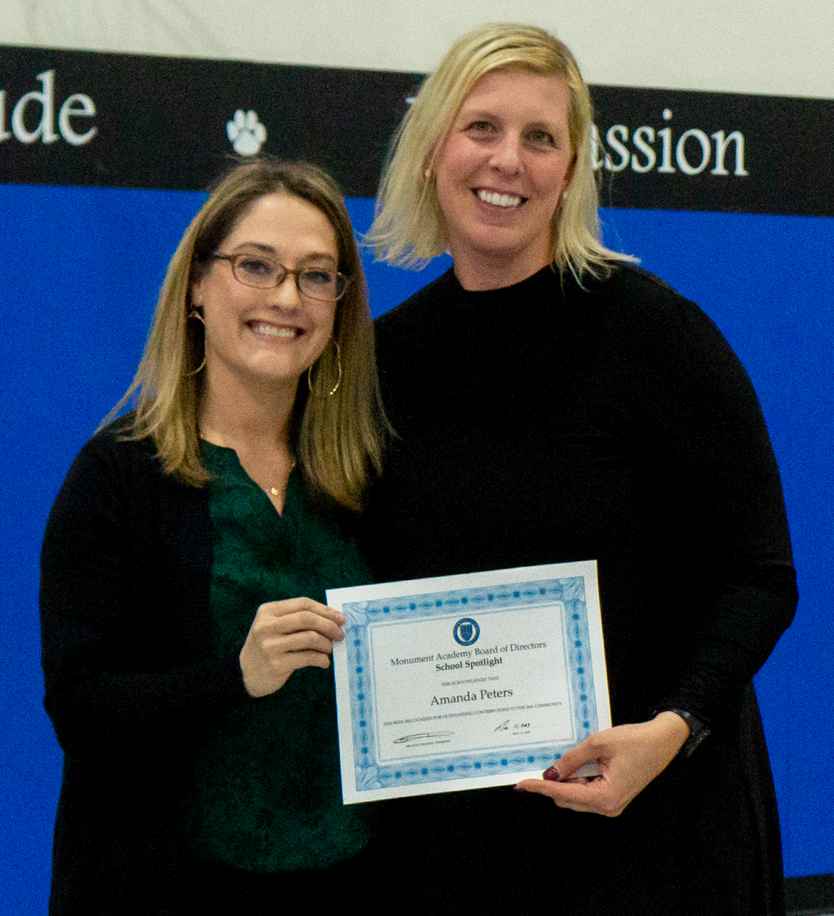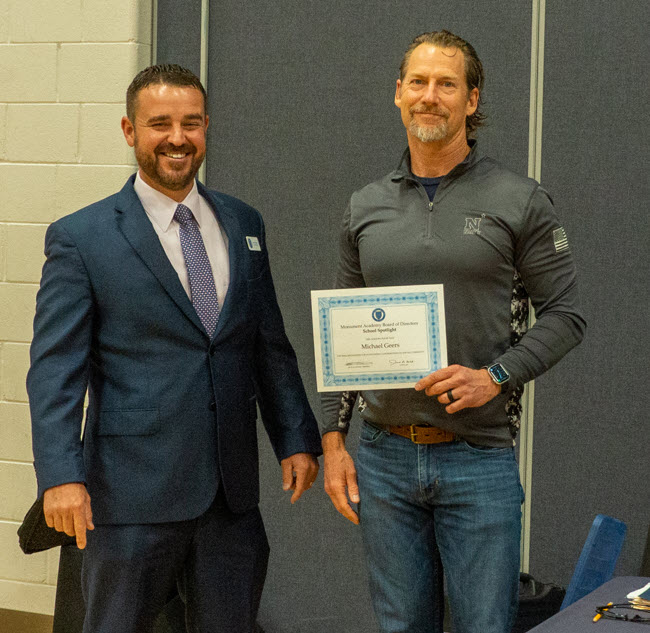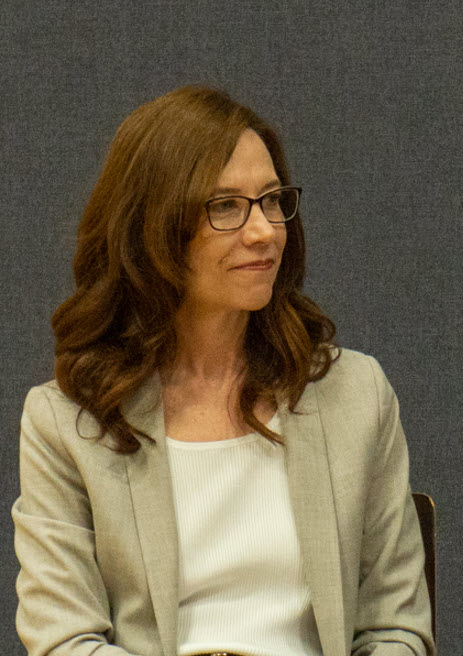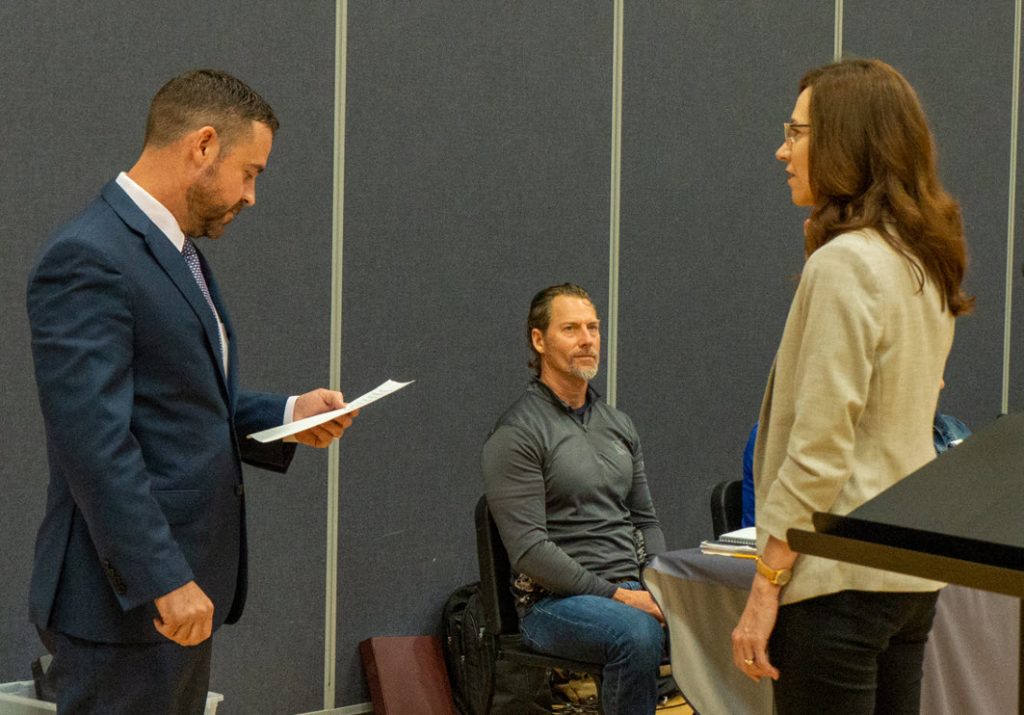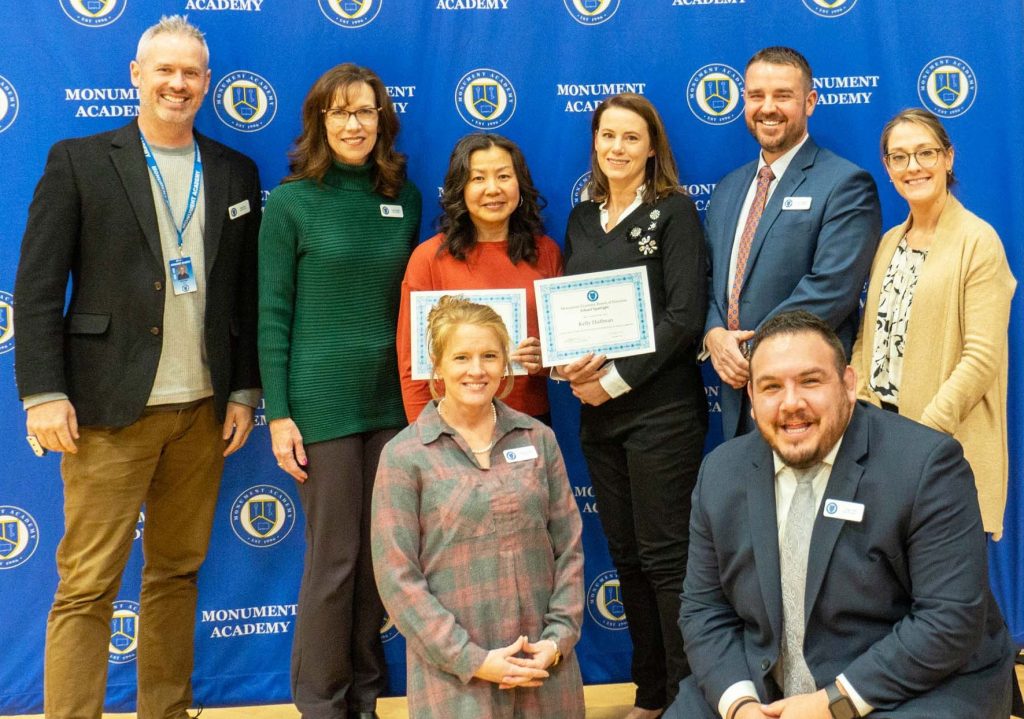- Intent to purchase Grace Best
- Homeschool enrichment program update
- Proposed aerospace program
- Additional modulars approved
- Highlights
By Jackie Burhans
At the Monument Academy (MA) board meeting on Feb. 13, the board agreed to draft a letter of intent to purchase the Grace Best Education Center building. It heard an update on its Homeschool Enrichment Program, learned about a proposed aerospace program, and approved new modular buildings.
Intent to purchase Grace Best
At the beginning of its regular meeting, the board amended its agenda to add an item for “negotiations for real property” to the executive session. When the board returned from the executive session, board President Ryan Graham said the board saw an incredible opportunity to potentially partner with D38 and utilize Grace Best for some of MA’s programs. He moved that the board direct legal counsel to draft a letter of intent to purchase Grace Best and have Executive Director Collin Vinchattle contact the D38 administration team to advise it of MA’s interest.
The board unanimously passed the motion, and Graham said that MA would still have a due diligence opportunity to inspect and review the findings with Grace Best but would like to use the facility for MA programs. See the PCAC article on page < 6 >.
Homeschool enrichment program update
At the beginning of the meeting, Graham read two public comments submitted electronically from parents who praised the Monument Academy Homeschool Partnership (MAHP) program. They said it provided the opportunity to socialize, gave access to reading and math tests and field trips, and was a great supplement to homeschooling.
Vinchattle said they had been planning for 15 students in the first year of MAHP and were currently at 35 and looking to grow next year. He said MA had adjusted so it could accommodate 108 students at the K-5 grade levels. MA has been marketing at events like the school choice fair and was looking to create relationships to offer classes at small businesses. Graham said he had the opportunity to meet with Program Manager Janyse Skalla to catch up.
For more information on MA’s homeschool enrichment program, see https://www.monumentacademy.net/homeschool/.
Proposed aerospace program
Vinchattle introduced the Falcon Aerolab Program for preliminary discussion, saying that he hoped to bring a contract to the board in March. He said the program focuses on flying and aeronautical offerings such as drones, mechanics, and understanding flight. MA is looking to bring the program to high school students. More information on the program can be found at https://www.falconaerolab.org/.
Additional modulars approved
Vinchattle reviewed the opportunity to acquire up to three modular units from D20, noting they could be used for High Performance Program (HPP) students or other new or existing programs and storage for athletic or drama equipment.
Interim Chief Financial Officer Glenn Gustafson said the cost for each modular would be $1, but they would cost $15,000 to $20,000 to move and would need carpet, paint, ramps, and electricity. Vinchattle said that it had cost $120,000 to $150,000 for the infrastructure for the existing modulars but that it should be a little less for this new set.
Gustafson said portables provide schools with flexibility and that it was critical that MA could expand as it builds programs for the school. This would give new program capacity and provide temporary space during capital construction. He said that if MA refinances its bond and starts construction in summer 2025, it would take one year to 15 months to complete. MA would need space to accommodate kids since it would need additional students to pay for the debt on the bond refinancing.
Vinchattle said the work would start in the next fiscal year, and he would designate Operations Manager Jake Dicus to take the lead on the project and secure bids.
The board unanimously approved the budget to acquire and set up three modular units.
Highlights
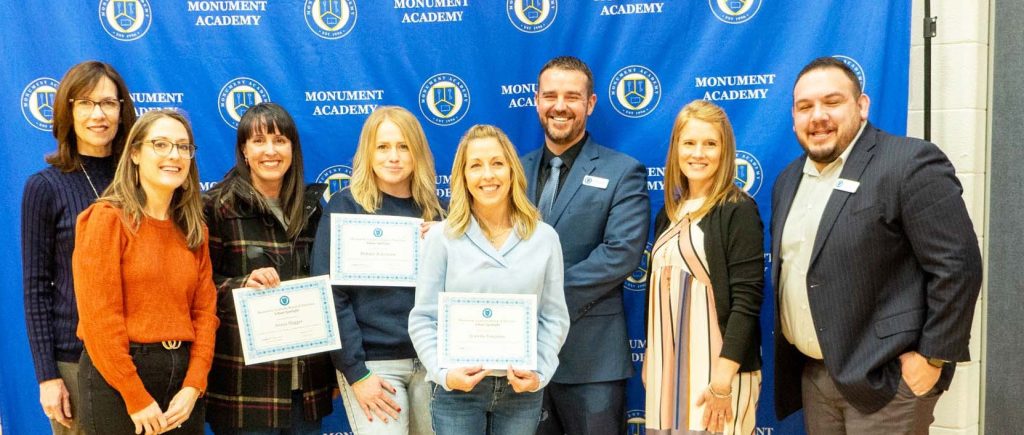
Board meeting highlights include:
- Board member Craig Carle spotlighted MA’s preschool team, including preschool teachers and assistants Anaya Hagger, Asha Nada, Sydney Heher, Stephanie Pontius, Brittany Robertson, Jeanette Tanguma, and Dyann Wenckus. Carle said a fellow staff member nominated the group, noting that the preschool had just completed its annual Colorado Department of Education licensing. He said the teachers use daily checklists and had worked hard to build enrollment, recently completing an inspection with zero violations.
- Vinchattle said that MA was starting to run low on snow days, with only 2.5 left at secondary school. His first choice would be to transition to full days on Fridays, then to e-learning days.
- Finance Director Laura Polen reported that net income was positive at elementary, middle, and high school.
- Board member Jilinda Dygert reported for the East Campus School Accountability and Advisory Committee (SAAC) that MA had hosted Dr. Michael Brom, the D38 assessment coordinator, for a presentation on student assessments. Parents reported feeling more prepared to help their students prepare for a college career. She said SAAC East hopes to offer more informational nights.
- Vice President Lindsay Clinton reported that the Resources and Development Committee was focused on the upcoming gala event, which would raise funds for a field for athletes, field day, and community events.
- The board unanimously approved the 2025-26 school calendar and the proposed 2026-27 school calendar for preschool, elementary, and high school.
- The board approved the BTR-MA Teacher Representative to the Board. It was renamed from policy 1515, and the reference from chief executive officer to executive director was changed. Graham asked if there were any incentives for teachers to participate; Vinchattle said no, it was optional.
- The board unanimously approved policy JCS-MA (formerly 1523) Class Size, adding a limit of 15 students for half-day kindergarten and 18 for full-day kindergarten.
- The board unanimously approved changing JG-MA Enrollment and Placement policy to move the cutoff date to Oct. 1 from Aug. 15 to match D38. Bryce Carlson of Miller Farmer Carlson Law, the school’s law firm, added proof of residency requirements and additional reasons for enrollment denial.
- The board unanimously approved modifications to MA’s Bylaws in section 2.1, defining members to include each parent of a child currently enrolled in MA’s traditional brick-and-mortar program.
- Vinchattle reported that the HPP oversight committee had met twice and was focused on better understanding but was leaning toward a flexible model that would have the opportunity to gain the greatest number of students.
- Clinton noted that the School Board election applications would remain open until the end of March.
**********
The MA School Board meets at 6:30 p.m. on the second Thursday of each month. The next regular board meeting will be on Thursday, March 13 at 6:30 p.m. at the East Campus. For more information, visit https://bit.ly/ma-boe;; for the agenda and packet, see https://bit.ly/ma-boarddocs.
Jackie Burhans can be reached at jackieburhans@ocn.me.
Other Monument Academy School Board articles
- Monument Academy School Board, Feb. 13 – Board expresses interest in Grace Best building (3/1/2025)
- MA School Board, May 11, 25 – MA addresses gender issues, budgets (2/23/2025)
- Monument Academy School Board, Jan. 6 and 9 – Board hears bond refinancing, action plan (2/1/2025)
- Monument Academy School Board, June 8 – Board reorganizes, hears legislative (1/23/2025)
- Monument Academy School Board, Dec. 17 – Board hears academic dashboard report (1/4/2025)
- Monument Academy School Board, Nov. 18 and 21 – Board responds to organization audit (12/5/2024)
- Monument Academy School Board, Oct. 17 and 24 – Board hears financial audit, improvement plan, internal review (11/2/2024)
- Monument Academy School Board, Sept. 12 – Board discusses parental review of library materials, adopts management system (10/5/2024)
- Monument Academy School Board, Aug. 8, 16, and 29 – Board sets non-legal name change policy (9/7/2024)
- Monument Academy School Board, July 11 – Board resolution related to Title IX (8/3/2024)

